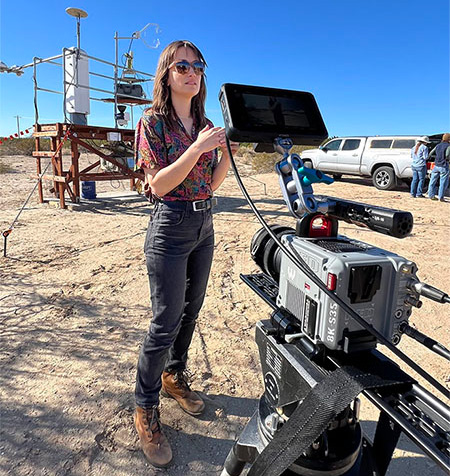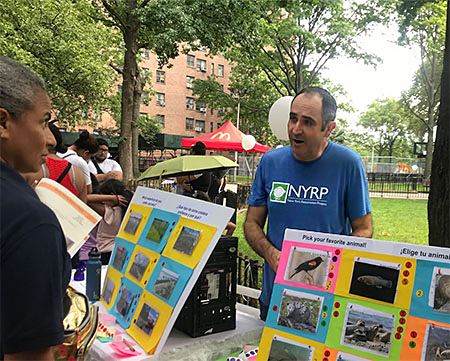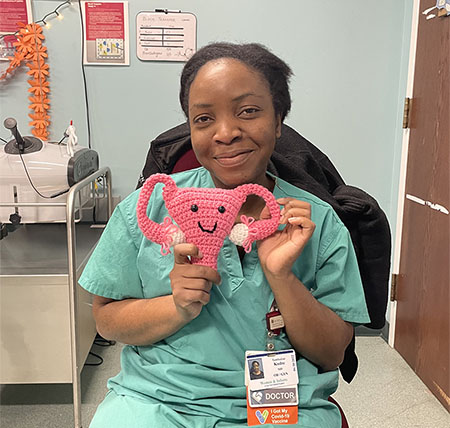13 Alumni Share Their Science Journeys

Bennington's unique hands-on approach, embrace of all things multidisciplinary, and strong faculty mentorship sets Bennington science students apart. Thirteen alumni with careers in the sciences share how the creative and nimble education they received at Bennington and how it has helped advance their careers.
“I don't think I would ever have taken college-level science if I hadn't gone to Bennington. Nora LaCasse ’13
“I don't think I would ever have taken college-level science if I hadn't gone to Bennington, said Nora LaCasse ’13, who studied geology and chemistry and who teaches computer science to high school students in Burlington, VT. She had avoided science in high school. But when an advisor suggested she try a class she normally wouldn't take, she ended up in geology with Tim Schroeder.
“I loved it and loved that I could take science classes where I really knew my professors, where I could ask questions in a small class and feel comfortable, and be a part of the science community,” she said.
When she was asked to teach computer science, rather than chemistry, she took on the challenge, even without having the background; because Bennington had taught her that she had the capacity to dive into something new and figure it out.
Nora is among several alumni working in the sciences who feel Bennington helped them discover their passion, hone their professional skills, and approach career challenges with confidence. Educators, engineers, entrepreneurs, researchers, and surgeons who got their start at Bennington share where they are a decade or two into their science careers and reveal how Bennington affected their professional lives.
How to Make One's Own Way
Throughout her career, Alexandra Polubiec ’11, who studied Theater and Music, worked as a freelance writer and transcriptionist, a technical writer in the network industry, and a front-end software engineer. Now, she’s an independent video game developer and part-time coding instructor at Fullstack Academy.
Bennington taught me to take my career development and growth into my own hands,” she said. “My multi-disciplinary work in the arts directly affected my ability to work on collaborative cross-functional teams building software at major tech companies.
Software engineer Reid Ginoza ’09 of Pensacola, Florida, agrees. He studied Math and works at Triitus, Inc., which makes software that allows people to securely access highly sensitive data remotely.
“Studying and learning through the Plan process has given me the confidence to learn on my own,” Ginoza said.

Kate Furby PhD ’07, who lives in Washington, DC, tells “stories about tiny things that have a huge impact on our world.” She studied Biology at Bennington and now works as a freelance science journalist with multimedia pieces in outlets like National Geographic, Scientific American, Washington Post, and NPR.
After earning her doctorate in marine biology, Furby incorporated art, film, and writing into her career.
“I forged my own path, and Bennington definitely gave me the courage and creative training to think outside of the traditional routes.”

A Multidisciplinary Edge
Jason Smith ’98, the director of Northern Manhattan Parks, New York Restoration Project, studied painting, ceramics, and ecology at Bennington. For many years he grappled with a meaningful way to work across disciplines, but he finally found it in his current work designing natural restoration projects and coordinating research efforts.
“I lead the daily stewardship of several large underserved parks. I help implement projects to enhance the ecology and resilience of local communities,” said Smith. “This work requires interdisciplinary approaches, and I am grateful that Bennington provided rigorous grounding in specific disciplines but challenged me to work across boundaries.”
Daniel Brese ’05 studied Biology at Bennington and now works as an environmental consultant and engineer specializing in air quality permitting and dispersion modeling at ALL4 LLC.
“The Bennington Plan showed me how interconnected all fields of study can be both within the sciences and beyond. The Plan also demanded that I look past the boundaries that I had set for myself by choosing to major in biology,” he said. “That has helped me to remain receptive to career opportunities that led me outside of my field of study and into a multidisciplinary career that I never would have considered without that perspective.”
Marc Bogonovich ’03, too, used the multidisciplinary approach he learned at Bennington to build his career. He studied Ecology & Evolutionary Biology. Now, he’s the CEO and life sciences editor at Oceaneditors.com, which offers English language editing services to scholars, scientists, and engineers who are mostly nonnative English speakers. "My training at Bennington was excellent preparation for subsequent doctoral training and primary research conducted at Indiana University,” he said. “This has affected my life dramatically."
Hands-on Experiences
Many alumni are most grateful for the direct work experience they received.
For Polubiec, the theater/music-student-turned-game-developer, “Field Work Term showed me what I didn't want to do.” By giving her a realistic picture of her job prospects in the theater and music worlds, she realized that the work was not appealing to her. “I learned a lot of valuable lessons from those internships that drove many of my decisions after graduating, even if it took a few years to find a path that made sense for me,” she said.
For Caitlin (Hussey) Walker ’10, Field Work Term (FWT) was the single most valuable aspect of her Bennington education. She studied Physics and Teaching. “The most impactful FWT I had was with the Little Shop of Physics out of Colorado State University. It introduced me to the open-ended nature of hands-on science teaching and heavily influenced my approach as an educator,” she said.
After teaching physics for 11 years, Walker now works as the programs director for the Children's Discovery Museum of Central Maine, where she plans and implements programs and events for children ages 3-12. “It also gave me an opportunity to work with children, teaching them science outside of a formal classroom setting, which has prepared me for the work I now do every day,” Walker said.
I transitioned into the post-college world a little more aware of the expectations that were waiting for me, and I was able to focus on finding a path sooner as a result.
“My first job after college was a direct result of field work term experiences and relationships from the Santa Fe Institute,” said Skye Bender-deMoll ’01, whose Bennington education combined social science, complex systems, computer science, art, music, and video. “This also led to some specific projects which shaped my career for the next 10 years or so.” He works as a senior engineer at Meedan.org, an international non-profit that supports communities working for a better internet.
Enduring Skills

When Tambu Kudze, MD ’10, who lives in Boston, looks back on her Biology, Math, and Politics studies at Bennington, self-reflection is one of the biggest takeaways.
“We learned to critique work from all my classes, science and non science, which is something we do daily when reading research papers,” said Kudze, who is a second-year fellow in Pediatric and Adolescent Gynecology at Boston Children's Hospital/Harvard Medical School. “I find myself constantly reflecting on my work, re-evaluating what I can do better both surgically and clinically for my patients.”
Lucas Westcott ’03 is the director of Communications and Education for the National Park Service’s Apostle Islands National Lakeshore on Lake Superior in Wisconsin. Faculty members Mansour Farhang, Kerry Woods, and Janet Foley were especially important to him, even now.
“What I learned from Mansour about diplomacy, non-zero sum problem solving and working to understand the underlying motives of people you engage with are skills I use every day,” he said. “Janet helped me learn how to take complex scientific ideas and explain them to a non-scientific audience, which is what I do for a living now.”
The Value of Support
Many alumni credit specific faculty members for believing in them or introducing them to an important aspect of their careers.
“I worked closely with Amie McClellan on a research project which taught me both basic laboratory skills, and more importantly, how to independently drive a project,” said Christos Kougentakis, PhD ’12, who studied Molecular Biology and Chemistry and now works as a cell biologist and biophysicist at Lycia Therapeutics, a biotech start up. “This was critical to my success in graduate school and beyond.”
McClellan was integral for Pediatric Gynecologist Kudze, too. In fact, she shared, they are still in touch. “We worked on a project that was eventually published. I credit her with my research progress and success so far,” Kudze said.
“John Bullock's support was helpful to my finishing my degree at Bennington,” said Science Journalist Furby. “And his chemistry of color class was an essential part of my education, learning how science can inform our world.” Furby also mentioned faculty outside the sciences, including Mark Wunderlich and Mark Poirier.
They were supportive of my early writing, which certainly helped give me the confidence to enter journalism,” Furby said.
LaCasse, who may have never been a science student, much less a science teacher, said, “I really relied on feedback from Tim (Schroeder) and meeting with Tim to figure out how science classes worked. I needed a lot of support to be a science student, and at Bennington, I got that.”
The experiences of alumni who graduated 10-20 years ago are consistent with those who graduated in 2023. Read more about our recent alumni in the sciences and the experiences of current students.